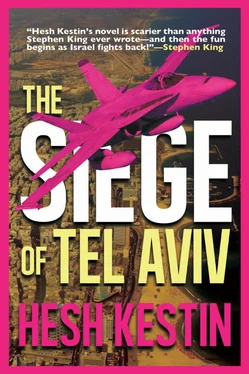He takes her in his arms long enough to tell her, “Cobi will be fine.” And then, like two hundred thousand other Israelis, Yigal Lev is gone into the night.
IN THE WAR ROOM of the Revolutionary Guard, an eerie silence pervades the subterranean space, a silence underscored by the cricket-like keystrokes of ninety intelligence officers bent over their computers before a display wall of coordinated monitors that can show a dozen scenes or be united to display a single image. Right now that image is Jerusalem, burning.
General Niroomad puffs on his second Montecristo. “Knesset,” he says to his technical assistant, a captain trained at Caltech.
The giant image zooms down to show a building destroyed, smoke rising above it in a black column. Earmarked as a prime target, the Israeli parliament has been destroyed not because its legislators might be in the plenum at four in the morning, but because of its symbolic significance, both to the Muslim attackers and the Jews.
“Haifa.”
Built along the sides of Mount Carmel as it flows liquid-like down to the enormous cranes of the container port at its base, the city is aflame. In the harbor, two dozen commercial ships list, some already half-sunk. Farther north, thirty-two IDF Navy missile boats burn in the harbor.
“Tel Aviv.”
Here the picture is different. Because only a few specific sites have been targeted, the city appears as peaceful as it should be this early in the morning, though traffic—running without headlights—has begun to move in the darkened streets
“Airbases.”
The single tiled-together screen devolves into twelve separate images, under which like subtitles in a foreign-language movie are the airbase names in Farsi. Except for these, each screen shows the same scene: IAF aircraft in flames, the tarmac beneath them itself a sea of fire. Here and there explosions erupt as fuel dumps ignite, making the screens go white, momentarily overwhelming the automated lighting adjustments of the satellite cameras.
General Niroomad carefully drops a half inch of ash into a crystal ashtray engraved with the seal of the Revolutionary Guard. So quietly only his adjutant can hear, he says what he has been longing to say for a year.
“Commence ground.”
COBI’S RADIOMAN CLIMBS DOWN off the tank to take a leak. For fear of angering the tank gods, no armored corps soldier will ever piss off the top of a tank, even a dummy tank. The radioman may not be a gung-ho soldier but he knows enough not to do that. He leaves the radio with Cobi.
There are now lights on the other side of the Jordan.
From his position standing atop the tank, Cobi lets his SLS drop down from the strap around his neck, as though somehow what the instrument tells him is false and he must see it for himself, through his own eyes. The far bank is now so well lit he does not need the night-vision device. Before him, a giant operation is in process, one which will change his life and those of six million other Israelis.
And, eventually, alter the world balance of power.
As if they are all controlled by the same switch, the steel rear doors on a hundred tractor-trailers crank open. This takes all of thirty seconds, but to Cobi it seems like an hour, not least because he cannot figure out what he is seeing, or even that he is seeing it. The rear doors on a hundred tractor-trailers are not supposed to be opening simultaneously at four in the morning on the Jordanian side of the Allenby Bridge.
But they are.
They remain open long enough for the young lieutenant to realize that what he is seeing is not only real but unaccountable. He checks his watch so that when he gets to company headquarters later in the morning, he will be able to make a precise report before setting off on his way to three complete days of leave, starting with a shower so long and so hot the water in his home’s solar boiler will begin running cold, and then a nice meal with his mother—he is partial to her macaroni and cheese, and she adores him for it, even if he does ruin the subtlety of her recipe with ketchup. Then he plans to go down to the beach, swim out a couple of hundred feet before returning to the sand to check out the girls. His father will be home by the time he rinses the sand off in the outdoor shower by the pool. His dad always comes home early when Cobi gets leave. The two will talk tanks for a while, which will almost certainly lead to his father asking him about the future: what does he really, really want to do? There is a certain inevitability in his going to work for his father’s huge enterprise, but like all Israelis who are conscripted into the military upon graduation from high school, Cobi faces beginning university at twenty-one or twenty-two, with three years ahead of him just to get his bachelor’s degree, and then maybe business school or law school or something he can’t know now, some mysteriously hazy and possibly dreary profession. Or he could stay in the military and take his degree as an officer, with any luck reaching his father’s reserve rank of major before he is thirty, and after that—
Abruptly this reverie is shattered. Bats? Bats in trucks? Then: A thousand bats with buzzing motors?
He sees them, but doesn’t believe what he sees until one drone peels off, making straight for his tank, a dummy but a convincing one.
HEADING NORTH ON THE coastal road, traffic thickening around him as more reservists head for their units, Cobi’s father shoots the BMW sedan to 130, then 140 miles per hour. As he drives, Yigal buttons his uniform shirt, then slips on his dog tag in its leather pouch, which most Israeli soldiers wear so that the metal won’t reflect light.
His pistol is on the passenger seat. All of this he keeps prepared: his field uniform hanging in the closet, IDF identification card in the placket pocket over his heart, a ballpoint pen and a yellow map marker in the right-hand pocket, along with a tiny steel jar, not much bigger than a thimble, in which he keeps the present his own father gave him on his induction into the IDF. “In case you fall into captivity,” his father told him. “They’re not like us.”
His father was a hospital orderly for forty years. One day during that time he must have liberated the pills in the steel container. Yigal never opened it. He is certain there is nothing left after so many decades in his pocket other than fine powder, and maybe even that has disappeared. He carries it for luck, and to remember. He taps the cellphone in his lap.
“Call Noam,” he tells it.
Busy circuit, a series of short buzzes.
He taps the phone again, this time pressing down heavily.
“Call No-am!”
The circuits are still busy. They will be all day and into the night. He knows why. After all, Yigal does control the second largest of Israel’s four cell phone companies, a gold mine really, but as with any gold mine, its proprietors—he is thinking of himself—are reluctant to invest when profits are easy, and equally reluctant when they seem like a distant goal. Why spend the profits when things are good? Why add to the losses when they are not? These are business decisions. But in times of emergency he is one of millions paying the price of his own investment strategy.
He presses his foot down on the accelerator pedal: 145, 150, 155. Beyond that, Yigal fears he will not be able to control this beast of a car. Should another automobile swerve into his lane it will be over for him in seconds. The brigade will be leaderless. He drops it down to 150. One-fifty is good , he thinks. I can handle one-fifty .
He turns off to the east before the exits for Haifa. Above the city already he can see the black smoke rising. The port is on fire, he thinks. No, he knows it. The car’s speakers, tuned to IDF Radio, little different from a commercial station in time of peace, are still calling codes: Dry Fish. Hairy Leg. Broken Nose. Dark—
Читать дальше












